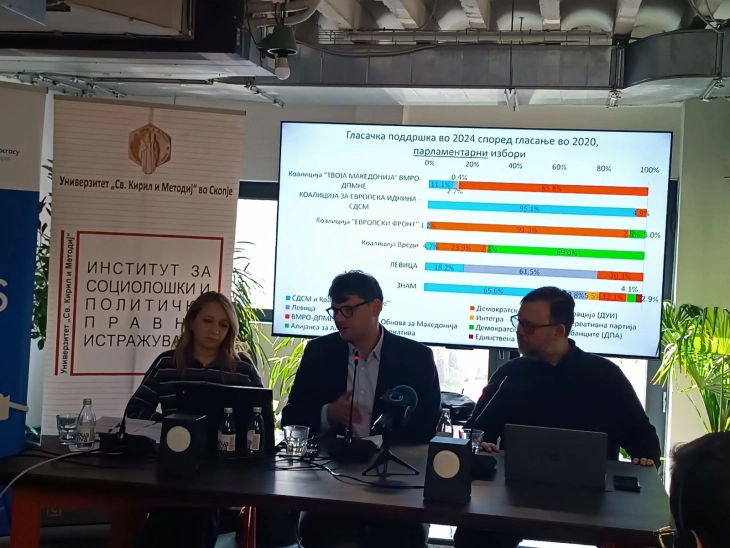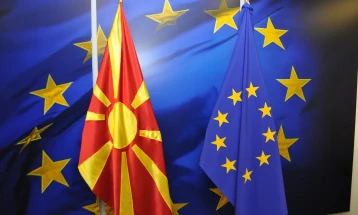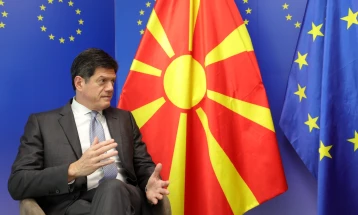Citizens usually vote along ethnic lines, every seventh citizen is a member of a political party: study
- Citizens in North Macedonia most often vote along ethnic lines, a high percentage of them are members of political parties, while women and young people are less engaged in political processes, shows a Comparative Study of Electoral Systems (CSES) carried out with the participation of the Institute of Sociological, Political and Juridical Research at the Ss. Cyril and Methodius University in Skopje (ISPPI), in collaboration with the Institute for Democracy Societas Civilis Skopje (IDSCS) and the North Macedonia Electoral Support Programme (IFES).

Skopje, 22 January 2025 (MIA) - Citizens in North Macedonia most often vote along ethnic lines, a high percentage of them are members of political parties, while women and young people are less engaged in political processes, shows a Comparative Study of Electoral Systems (CSES) carried out with the participation of the Institute of Sociological, Political and Juridical Research at the Ss. Cyril and Methodius University in Skopje (ISPPI), in collaboration with the Institute for Democracy Societas Civilis Skopje (IDSCS) and the North Macedonia Electoral Support Programme (IFES).
At an event Wednesday, ISPPI’s Jovan Bliznakovski said the study was carried out for the first time in North Macedonia as part of an international survey that has been conducted for 25 years and provides an overview of the electoral behavior of citizens in the country.
“The main findings clearly show that a lot of the citizens in Macedonia tend to vote along ethnic lines, this is something we already knew. However, with these findings, we can get some kind of insight into the extent of the tendency to vote along ethnic lines. There are exceptions, however they are very rare and apply only to certain political options,” Bliznakovski said.

According to the study, only two ethnic Macedonian parties have voters among the country’s ethnic Albanian population and other communities, while the parties of the ethnic Albanians don’t receive votes from the Macedonian ethnic community.
The study shows that North Macedonia ranks among the countries with the highest percentages of political party membership in Europe with 13.3 percent of respondents saying they are members of a political party, or every seventh citizen. The average in the EU, according to speakers at the event, is around 3 to 5 percent.
“The citizens are frequently involved in partisan activities. Most of the citizens have frequent, even on a monthly level, partisan activities. They are often involved in campaigns. For example, according to the study, during the last election campaign as many as a third of citizens participated in rallies or public events organized by political parties,” Bliznakovski said.
Women and young people are less engaged in the country’s political processes, with people aged 18-24 showing less interest in partisan engagement.
According to the findings, the country’s electorate was largely dissatisfied with the work of the previous government during 2020-2024, but this varied based on ethnicity.
“We can see significantly higher dissatisfaction among the ethnic Macedonians compared to the ethnic Albanians. In a way, the outcome of the elections can be interpreted as a kind of punishment of the previous government,” Bliznakovski added.

Asked if they voted for the same party at all previous elections, 37.4 percent of respondents provided an affirmative answer, 29.8 percent said they voted for the same party at most of the elections, 25.3 percent said they voted for different parties, while 1.1 percent said they never vote.
According to the study, most citizens (59.09 percent) know how they will vote before the elections, while almost 40 percent decide during the campaign (32.8 percent) or on election day (6.8 percent).
Regarding the presidential elections, 37.8 percent of respondents said the reason they voted for a presidential candidate is that they believed the candidate was the best choice for them, while 34.87 percent said they voted for a candidate because of a political party’s endorsement of that candidate.
Regarding the parliamentary elections, 34 percent of ethnic Macedonians said they voted for a certain party or coalition because of their election platform, while 35 percent of ethnic Albanians said they did so because of their trust in the leadership of the party.
The main reasons for not voting, according to the study, are a lack of interest in elections and politics (36 percent) and indifference over the outcome because of a belief that all political parties are the same (30.2 percent). These responses are dominant among respondents aged 34 and under.
The study was carried out from October 25 to December 4, 2024, on 1056 respondents with a response rate of 56.2 percent. It included all statistical regions and used data from the State Statistical Office based on the last implemented census.
Photo: MIA











